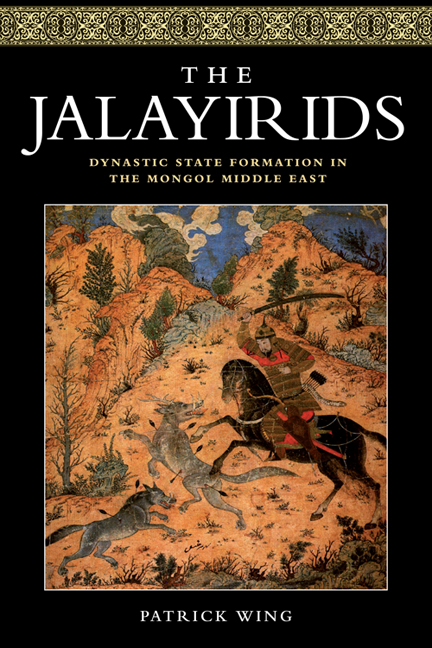Book contents
- Frontmatter
- Contents
- List of Illustrations
- Acknowledgements
- Abbreviations for Primary and Secondary Source Texts
- 1 Introduction and Sources for the History of the Jalayirids
- 2 Tribes and the Chinggisid Empire
- 3 The Jalayirs and the Early Ilkhanate
- 4 From Tribal Amirs to Royal In-laws
- 5 Crisis and Transition (1335–56)
- 6 Shaykh Uvays and the Jalayirid Dynasty
- 7 Dynastic Ideology during the Reign of Shaykh Uvays
- 8 Challenges to the Jalayirid Order
- 9 Conclusions and the Legacy of the Jalayirids
- Maps and Genealogical Chart
- Bibliography
- Index
3 - The Jalayirs and the Early Ilkhanate
- Frontmatter
- Contents
- List of Illustrations
- Acknowledgements
- Abbreviations for Primary and Secondary Source Texts
- 1 Introduction and Sources for the History of the Jalayirids
- 2 Tribes and the Chinggisid Empire
- 3 The Jalayirs and the Early Ilkhanate
- 4 From Tribal Amirs to Royal In-laws
- 5 Crisis and Transition (1335–56)
- 6 Shaykh Uvays and the Jalayirid Dynasty
- 7 Dynastic Ideology during the Reign of Shaykh Uvays
- 8 Challenges to the Jalayirid Order
- 9 Conclusions and the Legacy of the Jalayirids
- Maps and Genealogical Chart
- Bibliography
- Index
Summary
The military governorships that the Mongols had established in Khurasan and Azarbayjan were replaced by the Ilkhanate in the 1250s. Unlike the former governorships, which were responsible directly to the great qan in Qaraqorum, the Ilkhanate was a new princely ulūs, or appanage state, under the rule of Hülegü Khan, the brother of Möngke Qa'an. Hülegü's primary missions were to eliminate the Nizārī Ismā‘īlīs, or Assassins, who had made an attempt on Möngke's life, and the Abbasid caliphate in Baghdad. Hülegü's forces were successful in both of these missions, and by 1260 the lands between the Oxus and the Euphrates were under Hülegü's control. As in the other princely ulūses, which were mentioned in Chapter 2, members of the Jalayir and other Mongol tribes provided the manpower for Hülegü's army, and became the new amirs, or military elite, in Iran.
In the early years of the Ilkhanate, tensions developed between the khans (Hülegü and his descendants) and the amirs. In general, the khans sought to centre political power and wealth in their own hands, through a central government staffed mainly by native Persians. The amirs, in general, tended to resist this tendency toward centralisation, which threatened their own independence, power and wealth. Resistance among the amirs took the form of supporting alternative members of the Hülegüids, members of the Ilkhanid royal family, for the throne. Several Jalayir tribal families played a role in this struggle, which became particularly intense between 1282 and 1295.
This chapter examines the details of this struggle, which led ultimately to a centralisation process that eliminated all but one Jalayir family from political influence in the Ilkhanate. These Jalayirs were the descendants of Īlgā Noyan, a trusted commander of Hülegü during the Mongol invasion of the 1250s. By the end of the thirteenth century, the Ilgayid Jalayirs had become powerful amirs within the Ilkhanate, due to their ties to the royal family.
Īlgā Noyan and the Early Ilkhanate
The Jalayirid sultans of the fourteenth century were descended from Īlgā Noyan, who came to Iran in the army of Hülegü. He took part in the assault on Baghdad in January of 1258, leading a contingent of Mongol troops from the south of the city along the Tigris.
- Type
- Chapter
- Information
- The JalayiridsDynastic State Formation in the Mongol Middle East, pp. 48 - 62Publisher: Edinburgh University PressPrint publication year: 2016



